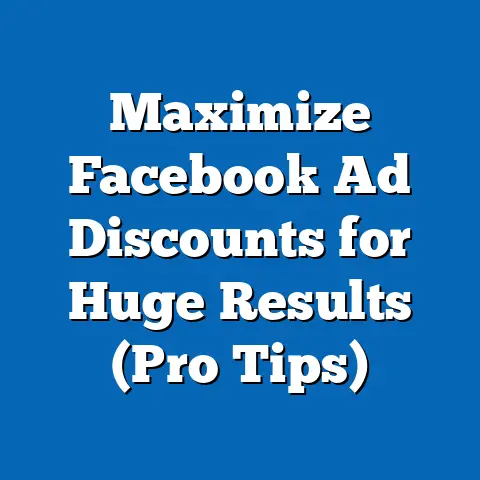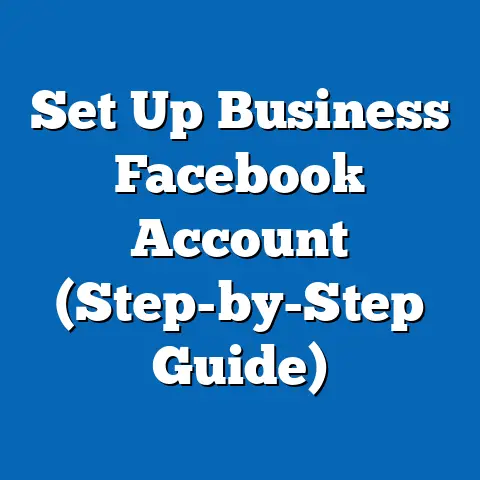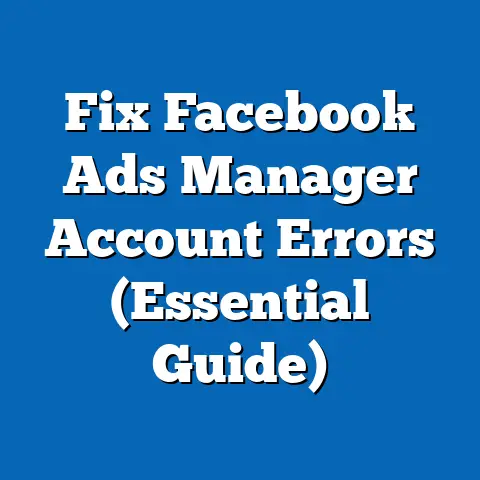Understand Facebook Ad Reviews (Essential Insights Unveiled)
Facebook advertising is a beast.
I’ve spent countless hours, and let’s be honest, a considerable amount of money, navigating its ever-changing landscape.
We all focus on targeting, creatives, and bidding strategies, but there’s a goldmine of information we often overlook: Facebook Ad Reviews.
I’m not talking about the star ratings on your business page; I’m talking about the direct feedback users leave on your ads.
These reviews, often tucked away in the comments section or in engagement metrics, offer invaluable insights into your ad performance, audience engagement, and overall marketing effectiveness.
This article isn’t just about acknowledging their existence; it’s about unlocking their hidden potential and transforming your approach to Facebook advertising.
Think of it this way: you’re launching a new product.
You meticulously craft your ad, target your ideal customer, and then… silence.
Or worse, you get negative comments.
Instead of getting discouraged, imagine using those comments to understand what resonated and what didn’t.
What if you could use that feedback to refine your messaging, improve your targeting, and ultimately, drive more conversions?
That’s the power of Facebook Ad Reviews.
Let’s dive in and uncover these hidden gems of knowledge together.
The Importance of Facebook Ad Reviews
Facebook Ad Reviews are the direct feedback left by users who have seen and interacted with your advertisements.
They’re not just random opinions; they’re a direct line to understanding how your target audience perceives your brand, your message, and your product.
They encompass everything from comments left directly on the ad to reactions, shares, and even negative feedback like reporting an ad.
In the complex ecosystem of digital marketing, these reviews play a critical role.
They provide a qualitative layer of data that complements the quantitative data we typically rely on (clicks, impressions, conversions).
While numbers tell you what happened, reviews tell you why.
They reveal the emotional connection (or disconnect) users have with your ad.
Why are they so significant?
Because they directly influence consumer behavior.
Studies have shown that consumers trust online reviews as much as personal recommendations.
A positive review can be the tipping point that convinces someone to click through and make a purchase.
Conversely, a stream of negative reviews can instantly kill your ad’s effectiveness and damage your brand reputation.
Takeaway: Facebook Ad Reviews are not just comments; they are a vital feedback mechanism that can significantly impact your ad performance and brand perception.
Hidden Benefits of Facebook Ad Reviews
Beyond the obvious benefit of gauging overall sentiment, Facebook Ad Reviews offer a plethora of hidden advantages that can significantly improve your advertising strategy.
Enhanced Targeting
I’ve seen firsthand how analyzing ad reviews can revolutionize targeting strategies.
Let’s say you’re running an ad campaign for a new line of organic skincare products, targeting women aged 25-45 interested in “natural beauty.” You start seeing comments like, “This is great, but I wish it was fragrance-free!” or “Does this contain essential oils?
I’m allergic.”
These comments reveal crucial nuances about your target audience.
You learn that a segment of your target market is highly sensitive to fragrances and essential oils.
This allows you to refine your targeting by excluding individuals with known allergies or sensitivities, or even create a separate ad campaign specifically for fragrance-free options.
This not only improves ad relevance but also reduces wasted ad spend by targeting only those who are genuinely interested in your product.
Improved Ad Quality
The quality of your ad directly impacts its performance.
Reviews provide valuable insights into what resonates with your audience and what falls flat.
For instance, if you’re running a video ad and receive comments like, “The audio is terrible!” or “The video quality is so low,” you know you need to address these issues immediately.
I remember one campaign where we were promoting a webinar.
The initial ad featured a poorly lit, unprofessional-looking video.
The comments were brutal: “Looks like it was filmed on a potato!” We quickly re-shot the video with better lighting and audio, and the difference was night and day.
Engagement soared, and webinar registrations skyrocketed.
The lesson?
Don’t underestimate the power of a high-quality ad.
Informed Decision Making
Ad reviews are a goldmine of data-driven insights that can inform future ad campaigns.
By analyzing the comments, you can identify patterns and trends that reveal what your audience values, what their pain points are, and what motivates them to take action.
For example, if you consistently see comments praising your product’s customer service, you can highlight this in future ads.
If you notice a recurring complaint about shipping costs, you can explore ways to reduce them or offer free shipping promotions.
This data-driven approach allows you to make informed decisions about your messaging, your offers, and your overall advertising strategy.
Competitive Advantage
Analyzing the reviews of your competitors’ ads can provide a significant competitive advantage.
By understanding what their customers are saying about their products and services, you can identify opportunities to differentiate yourself and offer a better solution.
Let’s say your competitor is running an ad for a fitness program, and you see comments complaining about the lack of personalized support.
This is your chance to capitalize on their weakness.
You can create an ad campaign that emphasizes the personalized support and coaching that your fitness program offers, positioning yourself as the superior choice.
I’ve personally used this strategy to outmaneuver competitors, gaining market share by addressing the unmet needs of their customers.
Takeaway: Don’t just see ad reviews as feedback; view them as a strategic tool for enhancing targeting, improving ad quality, making informed decisions, and gaining a competitive edge.
Analyzing Facebook Ad Reviews
Collecting and analyzing Facebook Ad Reviews requires a systematic approach.
It’s not enough to just glance at a few comments; you need to delve deep into the data to uncover actionable insights.
1. Collection:
- Monitor Comments: Regularly check the comments section of your ads.
Use Facebook’s built-in comment moderation tools to manage and respond to comments. - Engagement Metrics: Pay attention to engagement metrics like reactions (likes, loves, etc.), shares, and saves.
These metrics provide a broader picture of how your ad is being received. - Third-Party Tools: Consider using third-party social listening tools that can track and analyze comments across multiple ads and campaigns.
These tools often offer advanced sentiment analysis capabilities.
2. Analysis:
- Sentiment Analysis: Determine the overall sentiment of the reviews (positive, negative, or neutral).
This can be done manually or with the help of sentiment analysis tools. - Theme Identification: Identify recurring themes and topics in the reviews.
Look for patterns in the comments that reveal common concerns, questions, or praises. - Keyword Analysis: Analyze the keywords used in the reviews to understand the language and terminology your audience uses.
This can inform your ad copy and targeting. - Performance Metrics: Correlate review data with performance metrics like CTR and conversion rates.
This will help you understand how reviews are impacting your bottom line.
3. Tools and Metrics:
- Facebook Ads Manager: Use Facebook Ads Manager to track engagement metrics and manage comments.
- Sentiment Analysis Tools: Explore tools like Brandwatch, Mention, or Hootsuite Insights for advanced sentiment analysis.
- Click-Through Rate (CTR): Measures the percentage of people who click on your ad after seeing it.
- Conversion Rate: Measures the percentage of people who take a desired action (e.g., purchase, sign-up) after clicking on your ad.
- Cost Per Acquisition (CPA): Measures the cost of acquiring a new customer through your ad campaign.
Let’s say you’re running an ad for a new mobile app.
You notice that the ad has a high CTR, but a low conversion rate.
You start analyzing the ad reviews and see comments like, “The app looks great, but it’s too expensive!” or “I wish there was a free trial.”
This tells you that your ad is effectively attracting attention, but the price point or lack of a free trial is preventing people from converting.
You can then experiment with different pricing models, offer a free trial, or highlight the value proposition of your app to justify the price.
Takeaway: A systematic approach to collecting and analyzing ad reviews, combined with the right tools and metrics, can provide valuable insights into your ad performance and audience sentiment.
Common Themes in Ad Reviews
Analyzing Facebook Ad Reviews often reveals recurring themes that provide valuable insights into consumer preferences and expectations.
These themes can be categorized into several key areas:
- Messaging Clarity: Is your ad message clear, concise, and easy to understand?
Do users know what you’re offering and what you want them to do? - Visual Appeal: Is your ad visually appealing and engaging?
Do the images or videos capture attention and convey the right message? - Relevance to Audience: Is your ad relevant to the interests and needs of your target audience?
Are you targeting the right people with the right message? - Product Quality: Are users satisfied with the quality of your product or service?
Do they perceive it as being valuable and worth the price? - Customer Service: Are users happy with your customer service?
Do you provide prompt and helpful support when they have questions or issues? - Price and Value: Do users perceive your product or service as being a good value for the price?
Are they willing to pay for what you’re offering?
I recall a campaign where we were promoting a new line of eco-friendly cleaning products.
The initial ads focused heavily on the “eco-friendly” aspect, but the reviews revealed that users were more concerned about the effectiveness of the products.
Comments like, “Does it actually clean well?” and “Is it as effective as traditional cleaners?” were common.
We adapted our messaging to highlight the cleaning power of the products, emphasizing that they were both eco-friendly and highly effective.
This shift in messaging led to a significant increase in sales.
These themes are often influenced by psychological factors.
Consumers are driven by emotions, values, and beliefs.
Understanding these factors can help you craft ads that resonate on a deeper level.
For instance, if your target audience values sustainability, you can emphasize the eco-friendly aspects of your product.
If they value convenience, you can highlight how your product saves them time and effort.
Takeaway: Identifying and analyzing common themes in ad reviews, combined with an understanding of psychological factors, can help you craft more effective ads that resonate with your target audience.
Leveraging Reviews for Continuous Improvement
The true power of Facebook Ad Reviews lies in their ability to drive continuous improvement.
It’s not enough to simply collect and analyze reviews; you need to actively use the feedback to optimize your campaigns.
1. Adapt Your Ad Strategies:
- Refine Your Messaging: Use the insights from reviews to refine your ad copy and messaging.
Highlight the benefits and features that resonate most with your audience. - Improve Your Visuals: Update your images and videos based on feedback from reviews.
Use visuals that are visually appealing and convey the right message. - Adjust Your Targeting: Refine your targeting based on the demographics, interests, and behaviors of the people who are leaving positive reviews.
- Experiment with Offers: Test different offers and promotions based on what your audience is asking for.
Offer free trials, discounts, or bundles to incentivize conversions.
2. Stay Updated with Market Trends:
The market is constantly evolving, and consumer preferences are always changing.
By continuously monitoring ad reviews, you can stay ahead of the curve and adapt your strategies accordingly.
I’ve seen entire product lines pivot based on consistent feedback found in ad reviews.
It’s a direct line to the voice of the customer.
3. Successful Brands Leveraging Reviews:
Many brands have successfully leveraged Facebook Ad Reviews to improve their ad performance.
For example, a clothing retailer noticed that customers were consistently complaining about the sizing of their clothes.
They used this feedback to update their sizing charts and provide more detailed product descriptions, leading to a significant decrease in returns and an increase in customer satisfaction.
Another example is a food delivery service that noticed customers were complaining about long delivery times.
They used this feedback to optimize their delivery routes and improve their logistics, resulting in faster delivery times and happier customers.
I worked with a local bakery that was struggling to gain traction with their Facebook ads.
After analyzing the reviews, we discovered that customers were raving about their gluten-free options.
We completely shifted our ad strategy to focus on their gluten-free offerings, and the results were remarkable.
Sales skyrocketed, and the bakery became known as the go-to spot for gluten-free treats.
Takeaway: By adapting your ad strategies based on feedback from reviews and staying updated with market trends, you can continuously improve your ad performance and achieve better results.
The Future of Facebook Ad Reviews
The landscape of Facebook Ad Reviews is constantly evolving, driven by advancements in technology and shifts in consumer behavior.
Emerging trends suggest that ad reviews will become even more important in the future.
1. Artificial Intelligence and Machine Learning:
AI and machine learning are already playing a significant role in the analysis of ad reviews.
These technologies can automate the process of sentiment analysis, theme identification, and keyword analysis, allowing advertisers to quickly and efficiently extract actionable insights from large volumes of data.
In the future, AI may even be able to predict the likely impact of an ad based on historical review data, allowing advertisers to optimize their campaigns before they even launch.
2. Personalized Recommendations:
As Facebook becomes more sophisticated in its ability to understand user preferences, it’s likely that ad reviews will play a role in personalized recommendations.
Facebook may use review data to recommend products and services to users based on their past interactions and preferences.
3. Transparency and Authenticity:
Consumers are increasingly demanding transparency and authenticity from brands.
In the future, it’s likely that Facebook will place even greater emphasis on the authenticity of ad reviews, cracking down on fake reviews and incentivizing genuine feedback.
4. Voice Search and Conversational AI:
With the rise of voice search and conversational AI, it’s likely that ad reviews will become more conversational.
Users may be able to ask questions about products and services and receive answers based on review data.
5. The Metaverse and Virtual Reality:
As the metaverse and virtual reality become more mainstream, it’s likely that ad reviews will extend into these virtual environments.
Users may be able to leave reviews on virtual products and experiences, providing valuable feedback to advertisers.
These trends suggest that Facebook Ad Reviews will become even more integrated into the advertising ecosystem in the future.
Advertisers who embrace these trends and leverage the power of ad reviews will be well-positioned to succeed in the ever-changing world of digital marketing.
Takeaway: The future of Facebook Ad Reviews is bright, driven by advancements in technology and shifts in consumer behavior.
Advertisers who embrace these trends will be well-positioned to succeed.
Conclusion
Facebook Ad Reviews are more than just a collection of comments; they are a powerful tool for enhancing your advertising efforts.
By actively engaging with your ad reviews, you can uncover hidden insights that can help you refine your targeting, improve your ad quality, make informed decisions, and gain a competitive advantage.
Throughout this article, I’ve shared essential insights into the importance of Facebook Ad Reviews, highlighting their hidden benefits, providing guidance on how to analyze them, and exploring strategies for leveraging them for continuous improvement.
I’ve also speculated on the future of Facebook Ad Reviews, suggesting that they will become even more integrated into the advertising ecosystem in the years to come.
It’s crucial to remember that your audience is constantly talking, and your ads are part of that conversation.
By actively listening to what they’re saying, you can craft more effective ads that resonate with their needs and desires.
Call to Action
Don’t underestimate the power of Facebook Ad Reviews.
Start actively engaging with your ad reviews today to uncover insights and drive your campaigns forward.
Share your own experiences with Facebook Ad Reviews in the comments below or on social media to foster community discussion.
Let’s learn from each other and create a more effective and engaging advertising ecosystem.
Go beyond the numbers, listen to your audience, and let their feedback guide your advertising journey.
You might be surprised by what you discover.






